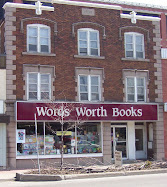
HI folks, this is Sally Melville (knitting author), who will be signing at WORDSWORTH May 5. In preparation for that event, I'm posting here--and I'll start by saying that the most bizarre day of my life happened in California where a man offered me $50 million to start a chain of yarn shops. (This was back in the heydey of knitting when there wasn't enough yarn to satsify demand.) Obviously, I didn't do this: if I had, I would be the most hated person in the yarn world, sucking all available fibre into the black hole of a chain, killing little locals. So I thought about why I don't like chains. And here's my list.
They aren't sensitive to their demographic.
They aren't sensitive to their geography.
They don't pay their staff as well.
They hire fewer staff per square foot than small retailers.
They don't put as much money into the local economy.
They don't give as much money to local charities.
They don't have the unique character a local shop does.
They are usually in outlying areas, which requires that I drive some distance from where I live.
They specialize in lower end goods.
They usually have a much more limited range of inventory.
They're often so big that I have to wander through lots of stuff I don't want to find the thing I do want.
What is the single advantage to a chain?
Lower prices.
Period. I can spend money on gas to drive to outlying areas to wander around—looking for service—through an inventory with fewer choices and yarns of lower quality than I might find at my LYS. Wow.
I understand needing to save money in tough times. But what price have we paid for saving these few dollars? I'm not an expert on global economies, but it seems to me that by giving our business to the large chains, we have squeezed out our little downtowns and their locally-owned shops, and how well has that served our towns, cities, local economies, and society in general?
While I don't know much about all this stuff, there are people who do. One of them is Jane Jacobs—a brilliant thinker who wrote some very important books. Perhaps her most well-known was The Death and Life of Great American Cities. The one I have read was Dark Age Ahead.
In this latter book—which I have lent out and so cannot quote—I remember reading that successful societies (ones that have survived longer than ours) are expensive. They support their artists, their teachers, their child-care providers, their disabled, their aged, their workers, their suppliers of goods. They don't outsource for cheaper goods: they pay what they must to support the care and welfare of their community's citizens.
Since we might all have fewer disposable dollars in the times ahead, we may now be looking at what she called an expensive society. So how do we make the best use of our spending dollars? Look for cheaper goods? There are people who will tell you that the solution is to shop at WALMART. But I could not disagree more. I believe that what we need to do is behave as if we are part of expensive but successful society. This means that we look very carefully at where and how we spend our money. And it seems to me that supporting our communities--by buying goods and services from our small, local, independent businesses--is a first step in the road to recovery.
--Sally Melville


1 comment:
Here, here!! Wonderfully expressed and very timely when my resolve to do as you suggest -- "behave as if we are part of an expensive but successful society" by choosing wisely from local community businesses -- sometimes wavers when I wonder if my actions will make any difference. Thank you.
Post a Comment